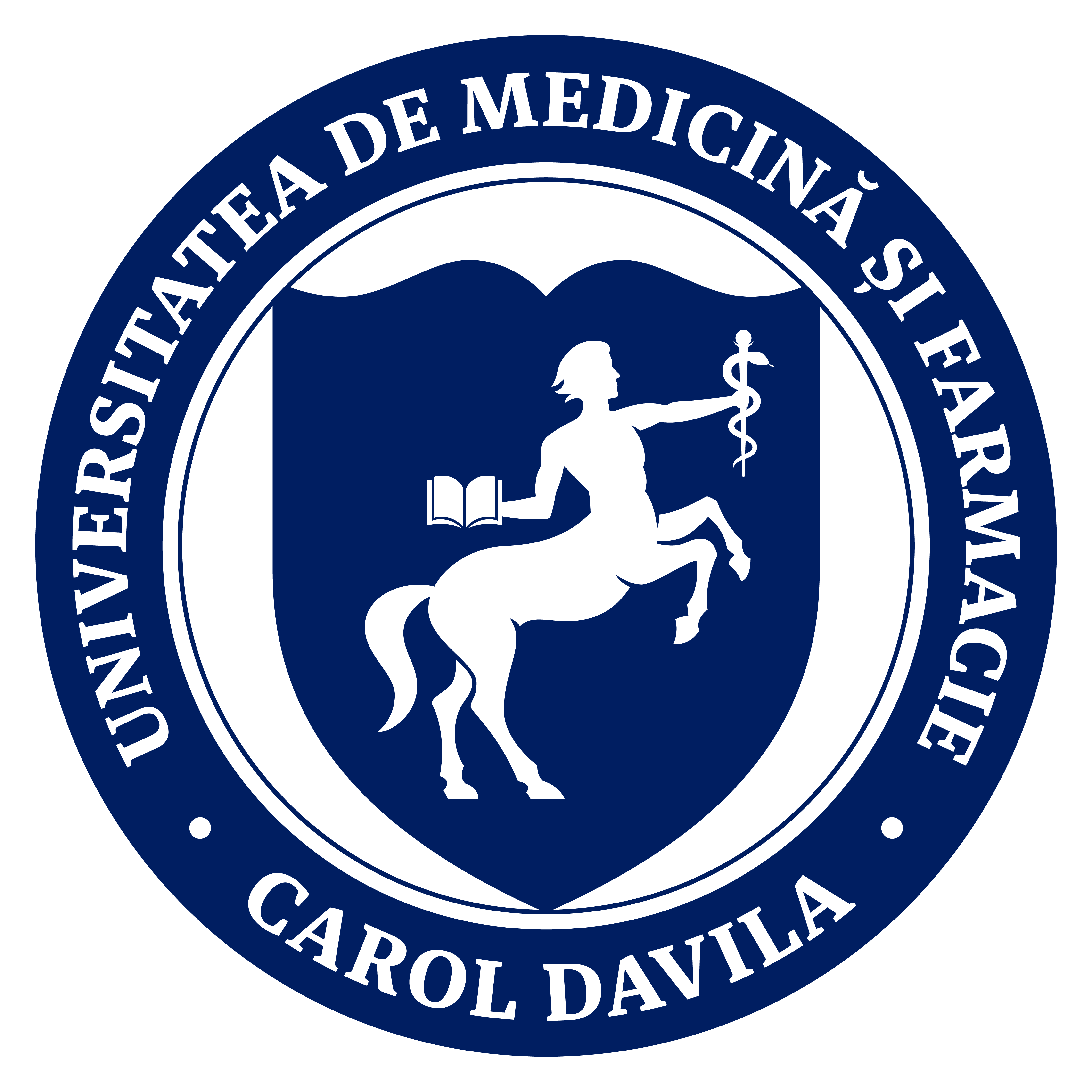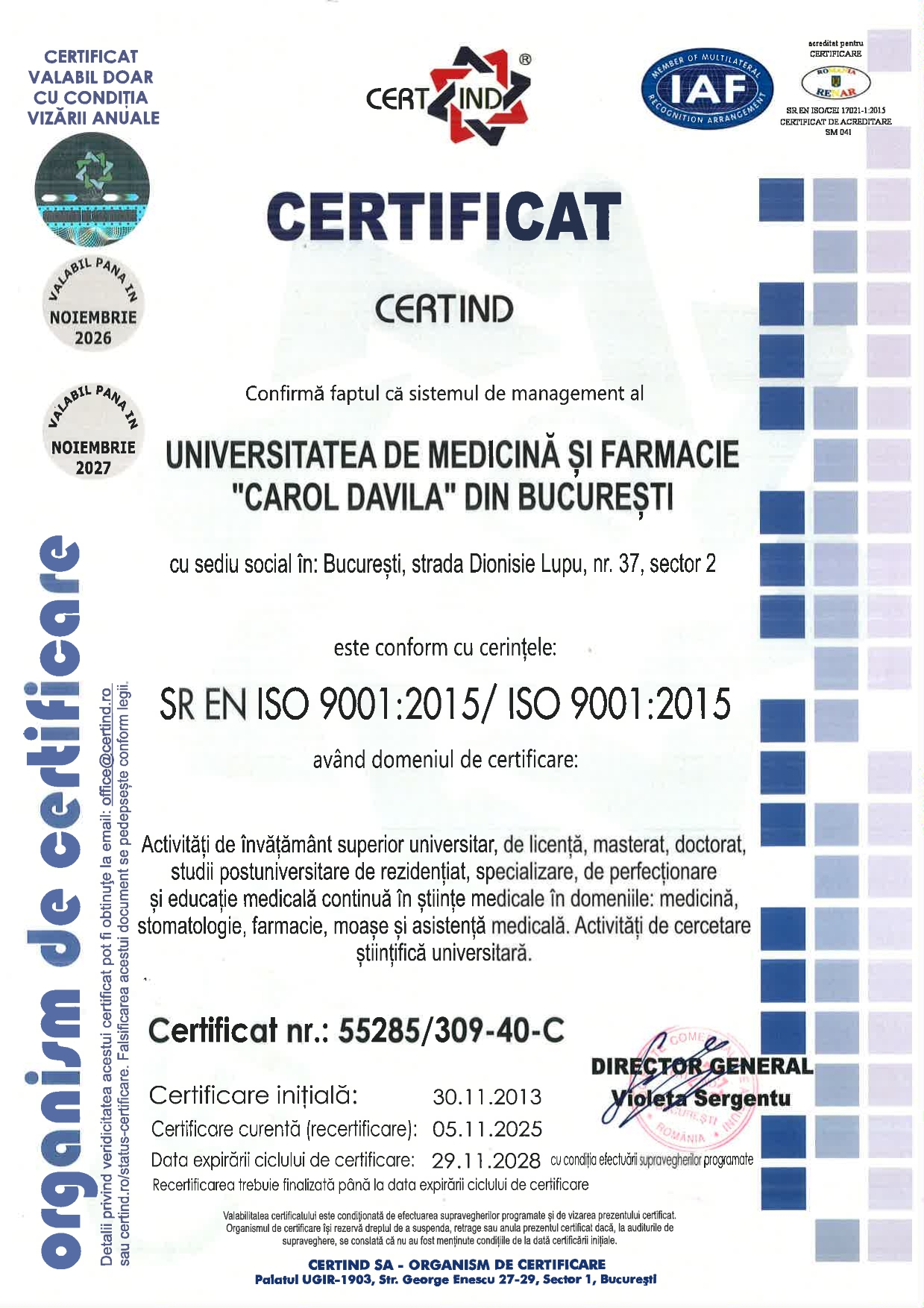[disc_cadre titlu="disc"]
- List of academic staff
- Short history
- Activity description
- Useful information on postgraduate courses
- Useful information for PhD students
- Keywords describing subdomains of interest for research
- Representative research projects
- Representative scientific papers
[disc_cadre list="cadre"]
Basic knowledge of pharmaceutical chemistry have been taught since the early years of the National School of Medicine and Medicine Pharmacy (1856-1859) by Carol Davila, M.D.. During 1862-1892 the discipline was led by professor Adolf Trausch., and in the following years by the professors: Mihail Georgescu (1892-1934), Gheorghe P. Pamfil (1934-1941) (the discipline was called the Department of Chemical and Galenic Pharmacy), Alexandru Ionescu-Matiu (1941-1947) (discipline was called Organic Pharmaceutical Chemistry), Constantin N. Ionescu (1948-1956), correspondent member of the Romanian Academy, Chief of the Pharmaceutical Chemistry Section and Director of the Pharmaceutical Research Institute (discipline was called Pharmaceutical Chemistry), E. Puşcaru (1956-1961), Emil Cionga (1962-1973), Victor Decebal Zotta (1973-1987), Jeana Vâlcoci Soare (1987-1989), Alexandru Vasile Missir (1989- 2002), Ileana Cornelia Chiriţă (2002-2007), Laurenţiu Moruşciag (2007-2016).
We mention that a special success of the activity of the discipline is the realization of clonidin, during 1974-1992, under difficult working conditions in laboratories, by teachers and students of the third and fourth years of study. The synthesis was performed on the basis of an original patent (authors Al. Missir, Ileana Chiriţă and Elena Grigorescu), and the amount of synthesized substance covered the needs for the whole country at that time. A valuable contribution of the teaching staff was also the contribution to the editing of the Romanian Pharmacopoeia.
The didactic activity at the Discipline of Pharmaceutical Chemistry takes place during the 3rd and 4th study years.
The course aims to the complex presentation of drug substances based on chemical structures, taking into account their pharmacological properties, each active principle being presented in terms of common international name, chemical structure, methods of synthesis, physico-chemical and pharmaco-chemical properties, toxicological, therapeutic indications, pharmaceutical products.
Practical work includes main aspects of synthesis, in which students get acquainted with some basic operations of drug synthesis. They also work to identify and to do the qualitative and quantitative control of some drug substances, acquiring the necessary skills to perform the drug analysis, corresponding to the requirements of the Pharmacopoeia monographs.
Within the discipline are also taught two optional courses: Drugs for veterinary use and Drug Design Strategies, which addresses to students in the 5th year.
The concern of didactic team are the research and the thoroughgoing study of some themes studied for many years; the main research directions are the design studies, synthesis and characterization of new derivatives with potential therapeutic action, from the following classes:
- thioureas of 4-substituted phenoxymethylbenzoic acids, 2-phenylethyl benzoic acid, 2-thiophenecarboxylic acid, 3-thiophenecarboxylic acid and 2-thiopheneacetic acid,
- pyrazole compounds,
- tricyclic derivatives with central heptagonal cycle,
- sulfonic derivatives,
- substituted N-(2-dialkylaminoethyl) benzanilide,
- compounds with diarylsulfonamidic structure,
- 1,4- dihydropyridine.
Within these great research themes, students who are working on the student's academic groups are also trained and then they prepare their license work which are always accompanied by a rich experimental part.
Research activity was appreciated over time by awarding prizes, such as "Iuliu Hatieganu" prize of Romanian Academy awarded to Prof. Alexandru Missir and Prof. Ileana Chirita for the work done in the field of drug synthesis. In terms of research activity submitted by young researchers is remarkable the prize awarded by Gedeon Richter to Prof. Carmen Limban, and at the poster section to Prof. Camelia Elena Stecoza (Iasi 1998), and the prize at the e-posters category on the Design of Bioactive Substances section to Assoc. Prof. Diana Nuta (Iasi 2014).
In 2015, Assoc. Prof. Mihai NiALulescu received the Excellence Award for Pharmaceutical Research granted by the National College of Pharmacists. Within the scientific research activity a number of 13 doctoral theses and a habilitation thesis (Prof. Carmen Limban) were finalized at the department. The teaching staff participated in a series of scientific events, symposiums and national and international congresses, and held a sustained activity within the Pharmaceutical Sciences Society of Romania by participating in the scientific committee of Farmacia journal and its Editorial Advisory Board (Prof. Ileana Chirita and Prof. Camelia Elena Stecoza) and as a member of the Editorial Council of Biointerface Research in Applied Chemistry and Letters in Applied NanoBioScience (Prof. Carmen Limban). The teaching staff also works in the Integrated Research-Innovation Center for Organic Synthesis and Analysis, Biological and Pharmacological Evaluation (http://erris.gov.ro).
Postgraduate courses to be organized in the discipline of Pharmaceutical Chemistry in the academic year 2017-2018:
- Anxiolytic drugs.
- Responsible person: Prof. Carmen Limban, PhD.
- Antipsychotic drugs.
- Responsible person: Prof. Dr. Camelia Elena Stecoza, PhD.
- Hypnotic-sedative drugs
- Responsible person: Lecturer Carmellina Daniela Badiceanu, PhD.
- Antihypertensive drugs
- Responsible person: Lecturer Dragos Florian Ciolan, PhD.
- Drugs for veterinary use
- Responsible person: Assoc. Prof. Diana Camelia Nuta, PhD.
- Drug Design Strategies
- Responsible person: Assoc. Prof. Conf. Dr. George Mihai Nitulescu, PhD.
Note: The courses are addressed to all pharmacists who work in open and closed circuit pharmaceutical units.
Currently, within the Doctoral School, there are two active professors:
- Prof. Dr. Ileana Chirita and
- Prof. Dr. Carmen Limban
- organic synthesis
- spectrometry
- elemental analysis
- drug design
- drug chemistry
- Research regarding the synthesis, physicochemical characterization and testing of anti-infective activity of new compounds with tricyclic structure [6.7.6], UEFISCDI contract, no. 42-095, 2008- 2011.
- In silico, in vitro investigations of some compounds with anti-infective action, ANCS contract, bilateral cooperation project with Slovakia, no. 465, 2011- 2012.
- Synthesis and physicochemical characterization of novel 2-(2-phenethyl)-benzoyl-thiourea derivatives and their complexes with metals as potential antimicrobial substances, ANCS contract, bilateral cooperation project with Moldova, no. 419, 2010- 2012.
- Synthesis and antitumor evaluation of new pyrazole compounds, PN-II-RU-TE-2011-3-0228, 2011-2014.
- Sortase A inhibitors. New therapeutic solutions for the treatment of multiresistant gram-positive cocci infections. Project PN-II-RU-TE-2014-4- 1670, contract no. 342/2015, 2015-2017.
- Carmen Limban, Alexandru Vasile Missir, Alexandru Mihai Grumezescu, Alexandra Elena Oprea, Valentina Grumezescu, Bogdan Ștefan Vasile, Gabriel Socol, Roxana Trușcă, Miron Teodor Caproiu, Mariana Carmen Chifiriuc, Bianca Gălățeanu, Marieta Costache, Laurențiu Morușciag, Grațiela Pîrcălăbioru, Diana Camelia Nuță. Bioevaluation of Novel Anti-Biofilm Coatings Based on PVP/Fe3O4 Nanostructures and 2-((4- Ethylphenoxy)methyl)-N- (arylcarbamothioyl)benzamides. Molecules 2014, 19(8), 12011-12030;
- Carmen Limban, Alexandru Mihai Grumezescu, Mariana Chirea, Lilia Matei, Mariana Carmen Chifiriuc. Antimicrobial potential of benzamides and derived nanosystems for controlling in vitro biofilm development on medical devices. Current Organic Chemistry, 2013, 17 (2), 162- 175;
- Carmen Limban, Alexandru Vasile Missir, Khairi Mustafa Salem Fahelelbom, Moawia Mohammad Al- Tabakha, Miron Teodor Caproiu, Bassem Sadek. Novel N-phenylcarbamothioylbenzamides with anti- inflammatory activity and prostaglandin E2 inhibitory properties. Drug Design, Development and Therapy, 2013, 7, 883- 892
- 4. Magdalena Majekova, Camelia Elena Stecoza, Lucia Kovacikova, Pavel Majek, capitolul 33: ,The use of DRAGON molecular descriptors for the estimation of pharmacologic profile of dibenzothiepine and pyridoindole compouns, in Pokroky v analytickej chemii (Progrese in chimia analitica) (531 pagini), editata de Slovak University ofTechnology in Bratislava, Faculty of Chemical and Food Technology, Bratislava, 2013, ISBN 978-80- 227-3989- 4
- Camelia Elena Stecoza, Magdalena Májeková, Pavol Májek, Miron Teodor Căproiu, Luminiţa Măruţescu, Novel dibenzothiepins with antibiofilm activity demonstrated by microbiological assays and molecular modelling, Curr. Org. Chem., 2013, vol. 17, nr. 2, p. 113- 124;
- Nitulescu, GM; Draghici, C; Olaru, OT; Matei, L; Ioana, A; Dragu, LD; Bleotu, C. Synthesis and apoptotic activity of new pyrazole derivatives in cancer cell lines Bioorganic & Medicinal Chemistry, 2015, 23(17), 5799-5808.
- Nitulescu, GM; Draghici, C; Chifiriuc, MC; Marutescu, L; Bleotu, C; Missir, AV. Synthesis and antimicrobial screening of N-(1- methyl-1H- pyrazole-4- carbonyl)-thiourea derivatives, Medicinal Chemistry Research, 2012, 21(3), 308-314.
- Nitulescu, GM; Draghici, C; Missir, AV. Synthesis of new pyrazole derivatives and their anticancer evaluation. European Journal of Medicinal Chemistry. 2010, 45(11), 4914-4919.
- Diana Camelia Nuţă, Mariana Carmen Chifiriuc, Constantin Drăghici, Carmen Limban, Alexandru Vasile Missir, Laurenţiu Moruşciag. Synthesis, characterization and antimicrobial activity evaluation of new agents from benzamides class. Farmacia, 2013, 61(5), 966- 974,
- Carmellina Daniela Bădiceanu, Nicoleta Dimcevici Poesina, Alexandru Vasile Missir, Camelia Elena Stecoza, Mihaela Dinu, The phytobiological testing of some new thiourea derivatives, Farmacia, 2014, Vol. 62, 1, 23-33



